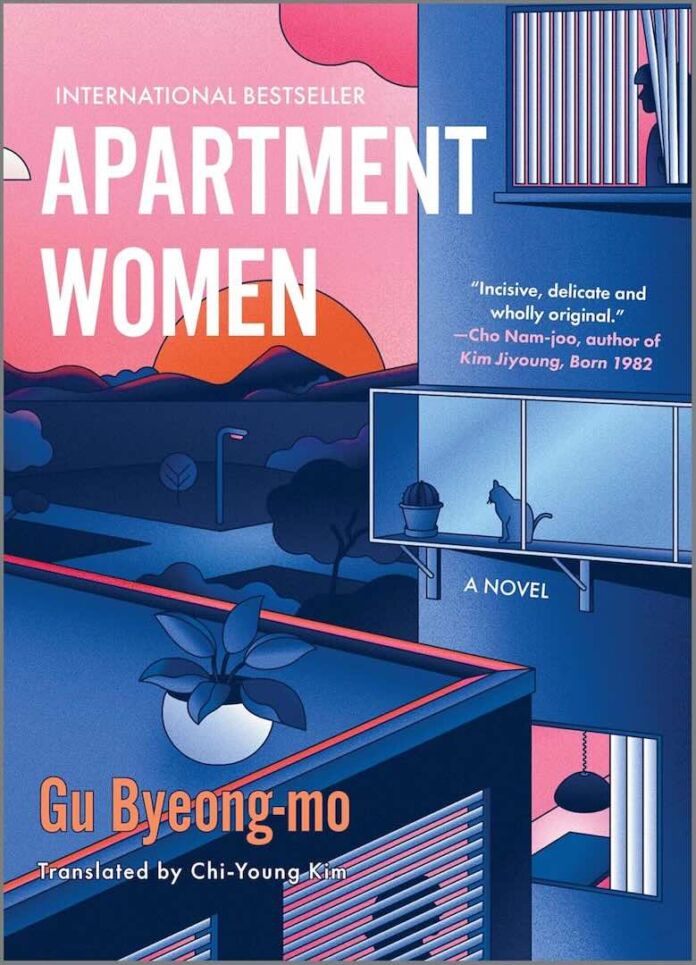In her latest novel, award-winning author Gu Byeong-mo crafts an intricate narrative that delves deep into the lives of four women brought together by an experimental housing project. Following the success of her previous work, The Old Woman with the Knife, Gu Byeong-mo once again demonstrates her keen ability to dissect social issues through compelling storytelling. Apartment Women presents a microcosm of modern Korean society, examining the intersection of government policy, personal ambition, and the ever-present pressure to conform to traditional family values.
The Premise and Setting
The Dream Future Pilot Communal Apartments, situated on the outskirts of Seoul, serve as more than just a backdrop—they become a character in their own right. This government initiative, designed to boost the nation’s declining birth rate, requires residents to commit to having three children within ten years. The setting’s isolation from urban amenities creates a pressure cooker environment where tensions simmer beneath a veneer of neighborly cooperation.
Character Dynamics and Social Commentary
At the heart of the novel are four distinct women:
- Yojin: A pharmacy cashier supporting her stay-at-home husband, wrestling with both financial instability and social expectations
- Danhui: The self-appointed community leader whose perfectionism masks deeper insecurities
- Hyonae: A freelance illustrator struggling to balance her artistic ambitions with motherhood
- Gyowon: A devoted homemaker whose carefully curated social media presence belies her domestic troubles
Writing Style and Narrative Structure
Gu’s prose is remarkably precise, wielding detail like a surgeon’s scalpel. She masterfully shifts perspectives among the characters, allowing readers to witness how the same events ripple differently through each woman’s consciousness. The author’s background in both literary and genre fiction shines through in her ability to maintain tension while delivering profound social commentary.
Themes and Social Critique
The Weight of Motherhood
The novel excels in its examination of how motherhood intersects with personal identity. Through Hyonae’s artistic struggles and Yojin’s role as primary breadwinner, Gu challenges traditional narratives about maternal sacrifice and fulfillment.
Community vs. Privacy
The communal living experiment raises questions about the boundaries between public and private life. The shared backyard table—a powerful symbol throughout the novel—represents both the promise and the pressure of forced community.
Government Intervention in Personal Lives
The novel’s premise cleverly critiques state attempts to engineer social outcomes through policy. The requirement to have three children serves as a metaphor for broader societal pressures faced by women in contemporary Korea.
Strengths and Notable Elements
- Psychological Depth: The character portrayals are nuanced and complex, avoiding easy stereotypes
- Environmental Symbolism: The recurring motif of animal stench perfectly captures the underlying rot in seemingly perfect social structures
- Dialogue: Conversations feel authentic while carrying multiple layers of meaning
- Pacing: The tension builds organically through small incidents and revelations
Areas for Improvement
While the novel is overwhelmingly successful, there are moments where:
- The symbolism becomes slightly heavy-handed
- Some secondary character arcs feel underdeveloped
- The resolution might leave readers wanting more concrete closure
Cultural Context and Universal Appeal
Though deeply rooted in Korean society, the themes of Apartment Women resonate globally. The pressure to conform to social expectations, the challenge of maintaining individual identity within community structures, and the complex dynamics of modern parenthood are universal experiences.
Impact and Significance
Apartment Women joins a growing body of contemporary Korean literature examining women’s roles in society, alongside works like Cho Nam-joo’s Kim Jiyoung, Born 1982. However, Gu’s unique focus on communal living and government intervention in family planning adds a fresh perspective to the conversation.
Final Verdict
Apartment Women is a masterful exploration of modern motherhood and social pressure. Gu Byeong-mo has created a work that is both intellectually stimulating and emotionally resonant. The novel successfully balances its critique of social policies with intimate character studies, resulting in a compelling narrative that will stay with readers long after they turn the final page.
Pros:
- Masterful character development
- Incisive social commentary
- Beautiful prose and symbolism
- Complex exploration of contemporary issues
Cons:
- Occasional heavy-handedness in metaphors
- Some subplots could be more developed
- Ending might feel unresolved for some readers
Recommended For
Readers who enjoy:
- Literary fiction with social commentary
- Complex female protagonists
- Stories about modern family dynamics
- Korean contemporary literature
- Examination of community and identity
Similar Works
Fans of Apartment Women might also enjoy:
- Kim Jiyoung, Born 1982 by Cho Nam-joo
- Please Look After Mom by Kyung-sook Shin
- The School Nurse Files by Chung Serang
- The Old Woman with the Knife by Gu Byeong-mo
This powerful novel stands as a testament to Gu Byeong-mo’s growing influence in contemporary literature, offering a nuanced exploration of motherhood, community, and personal identity in modern society. Through its careful examination of four women’s lives, Apartment Women provides valuable insights into the complexities of balancing individual desires with societal expectations.





